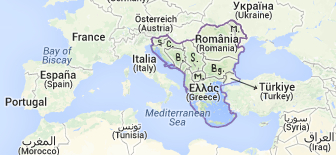Balkan countries
Balkan Countries
The Balkan countries are a geopolitical and cultural region in Southeast Europe characterized by their geographical location and shared history. The region takes its name from the Balkan Mountains that stretch from the border of Serbia to the Black Sea. The area is highly diverse in terms of ethnicity, culture, and religion, contributing to its rich history as well as its complex socio-political landscape.
Geography[edit | edit source]
The Balkans are bordered by the Adriatic Sea to the west, the Mediterranean Sea to the south, the Aegean Sea to the southeast, and the Black Sea to the east. The region includes the countries of Albania, Bosnia and Herzegovina, Bulgaria, Croatia, Kosovo, Montenegro, North Macedonia, Romania, Serbia, and Slovenia. Some definitions also include parts of Greece and Turkey within the Balkan Peninsula.
History[edit | edit source]
The history of the Balkans is marked by frequent conflicts and the rise and fall of many kingdoms and empires. The region was the birthplace of the first European civilization, the Ancient Greeks, and later came under Roman, Byzantine, and Ottoman rule. The 19th and early 20th centuries saw the rise of national movements that sought independence from the Ottoman Empire, leading to the Balkan Wars and eventually the First World War. The post-World War II period was dominated by socialist and communist influence, most notably in Yugoslavia. The late 20th century saw the violent breakup of Yugoslavia, leading to a series of conflicts known as the Yugoslav Wars.
Culture[edit | edit source]
The Balkans are known for their diverse cultural landscape. This diversity is a result of the various ethnic groups that inhabit the region, including Serbs, Croats, Bosniaks, Albanians, Greeks, Bulgarians, and many others. Each group has its own language, traditions, and religious affiliations, contributing to the rich cultural tapestry of the region. The Balkans are also famous for their culinary traditions, music, and folklore, which have been influenced by both Eastern and Western cultures.
Economy[edit | edit source]
The economies of the Balkan countries vary significantly in size, structure, and level of development. Historically, the region has been predominantly agricultural, but there has been a shift towards industry and services in recent decades. Tourism is a significant economic activity in coastal countries like Croatia and Montenegro, thanks to their beautiful beaches and historic sites. However, many Balkan countries still face challenges such as high unemployment rates, corruption, and political instability, which hinder economic growth.
Challenges and Prospects[edit | edit source]
The Balkan region faces numerous challenges, including political instability, ethnic tensions, and economic underdevelopment. However, there are also prospects for positive change. The expansion of the European Union (EU) has been a significant incentive for reform and cooperation among the Balkan states. Several countries in the region are either EU members or are in the process of integration, which has encouraged political and economic reforms. The future of the Balkans lies in further integration, both within the region and with the rest of Europe, which could lead to more stable and prosperous societies.
Search WikiMD
Ad.Tired of being Overweight? Try W8MD's physician weight loss program.
Semaglutide (Ozempic / Wegovy and Tirzepatide (Mounjaro / Zepbound) available.
Advertise on WikiMD
|
WikiMD's Wellness Encyclopedia |
| Let Food Be Thy Medicine Medicine Thy Food - Hippocrates |
Translate this page: - East Asian
中文,
日本,
한국어,
South Asian
हिन्दी,
தமிழ்,
తెలుగు,
Urdu,
ಕನ್ನಡ,
Southeast Asian
Indonesian,
Vietnamese,
Thai,
မြန်မာဘာသာ,
বাংলা
European
español,
Deutsch,
français,
Greek,
português do Brasil,
polski,
română,
русский,
Nederlands,
norsk,
svenska,
suomi,
Italian
Middle Eastern & African
عربى,
Turkish,
Persian,
Hebrew,
Afrikaans,
isiZulu,
Kiswahili,
Other
Bulgarian,
Hungarian,
Czech,
Swedish,
മലയാളം,
मराठी,
ਪੰਜਾਬੀ,
ગુજરાતી,
Portuguese,
Ukrainian
Medical Disclaimer: WikiMD is not a substitute for professional medical advice. The information on WikiMD is provided as an information resource only, may be incorrect, outdated or misleading, and is not to be used or relied on for any diagnostic or treatment purposes. Please consult your health care provider before making any healthcare decisions or for guidance about a specific medical condition. WikiMD expressly disclaims responsibility, and shall have no liability, for any damages, loss, injury, or liability whatsoever suffered as a result of your reliance on the information contained in this site. By visiting this site you agree to the foregoing terms and conditions, which may from time to time be changed or supplemented by WikiMD. If you do not agree to the foregoing terms and conditions, you should not enter or use this site. See full disclaimer.
Credits:Most images are courtesy of Wikimedia commons, and templates Wikipedia, licensed under CC BY SA or similar.
Contributors: Prab R. Tumpati, MD

